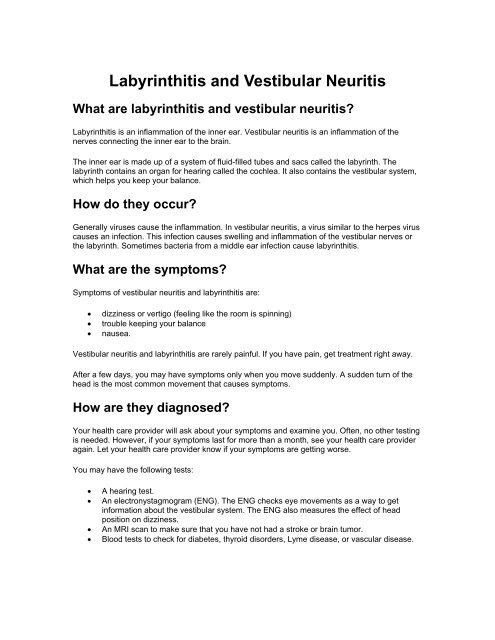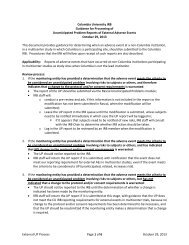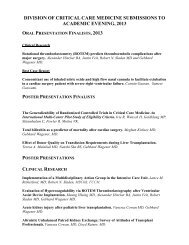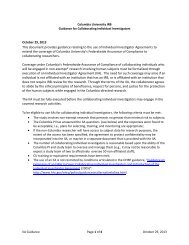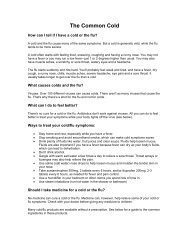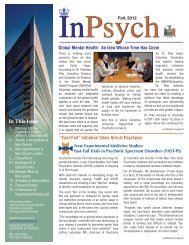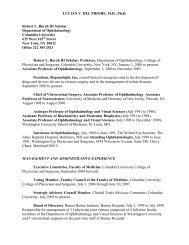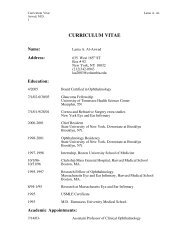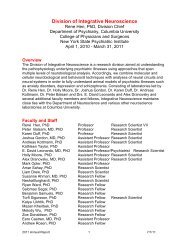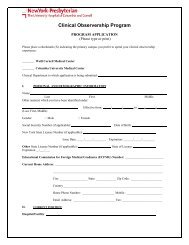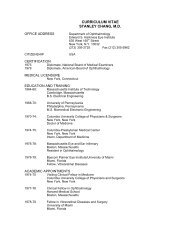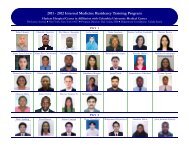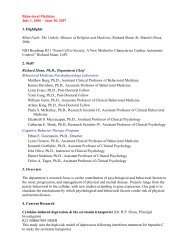Labyrinthitis and Vestibular Neuritis
Labyrinthitis and Vestibular Neuritis
Labyrinthitis and Vestibular Neuritis
Create successful ePaper yourself
Turn your PDF publications into a flip-book with our unique Google optimized e-Paper software.
<strong>Labyrinthitis</strong> <strong>and</strong> <strong>Vestibular</strong> <strong>Neuritis</strong><br />
What are labyrinthitis <strong>and</strong> vestibular neuritis?<br />
<strong>Labyrinthitis</strong> is an inflammation of the inner ear. <strong>Vestibular</strong> neuritis is an inflammation of the<br />
nerves connecting the inner ear to the brain.<br />
The inner ear is made up of a system of fluid-filled tubes <strong>and</strong> sacs called the labyrinth. The<br />
labyrinth contains an organ for hearing called the cochlea. It also contains the vestibular system,<br />
which helps you keep your balance.<br />
How do they occur?<br />
Generally viruses cause the inflammation. In vestibular neuritis, a virus similar to the herpes virus<br />
causes an infection. This infection causes swelling <strong>and</strong> inflammation of the vestibular nerves or<br />
the labyrinth. Sometimes bacteria from a middle ear infection cause labyrinthitis.<br />
What are the symptoms?<br />
Symptoms of vestibular neuritis <strong>and</strong> labyrinthitis are:<br />
• dizziness or vertigo (feeling like the room is spinning)<br />
• trouble keeping your balance<br />
• nausea.<br />
<strong>Vestibular</strong> neuritis <strong>and</strong> labyrinthitis are rarely painful. If you have pain, get treatment right away.<br />
After a few days, you may have symptoms only when you move suddenly. A sudden turn of the<br />
head is the most common movement that causes symptoms.<br />
How are they diagnosed?<br />
Your health care provider will ask about your symptoms <strong>and</strong> examine you. Often, no other testing<br />
is needed. However, if your symptoms last for more than a month, see your health care provider<br />
again. Let your health care provider know if your symptoms are getting worse.<br />
You may have the following tests:<br />
• A hearing test.<br />
• An electronystagmogram (ENG). The ENG checks eye movements as a way to get<br />
information about the vestibular system. The ENG also measures the effect of head<br />
position on dizziness.<br />
• An MRI scan to make sure that you have not had a stroke or brain tumor.<br />
• Blood tests to check for diabetes, thyroid disorders, Lyme disease, or vascular disease.
How are they treated?<br />
Your health care provider may prescribe medicines to reduce nausea <strong>and</strong> dizziness. If your<br />
nausea <strong>and</strong> vomiting cannot be controlled, you may need to go to the hospital.<br />
If you have an infection, you may also take medicine to treat the infection.<br />
How long do the effects last?<br />
It usually takes 3 to 4 weeks to recover from vestibular neuritis or labyrinthitis. You will probably<br />
need bed rest for 1 or 2 weeks. You may be left with some mild dizziness when you move your<br />
head, which can last for several years. Usually vestibular neuritis happens no more than once in<br />
a lifetime.<br />
How can I take care of myself?<br />
• If you are having a lot of nausea, drink just clear fluids, such as such as water, weak tea,<br />
<strong>and</strong> bouillon. Eat bl<strong>and</strong> foods such as soda crackers, toast, plain pasta, noodles,<br />
bananas, <strong>and</strong> baked or broiled potatoes.<br />
• Avoid stairs, heights, <strong>and</strong> driving while you are feeling dizzy.<br />
What can I do to help prevent vestibular neuritis <strong>and</strong><br />
labyrinthitis?<br />
Getting prompt treatment of a middle ear infection with antibiotics can prevent some cases of<br />
labyrinthitis. There is no known way to prevent infections of the inner ear caused by viruses.<br />
Published by McKesson Health Solutions LLC.<br />
This content is reviewed periodically <strong>and</strong> is subject to change as new health information becomes<br />
available. The information is intended to inform <strong>and</strong> educate <strong>and</strong> is not a replacement for medical<br />
evaluation, advice, diagnosis or treatment by a healthcare professional.<br />
Developed by McKesson Health Solutions LLC.<br />
Copyright © 2003 McKesson Health Solutions LLC. All rights reserved.<br />
Special Instructions:<br />
Copyright © Clinical Reference Systems 2004<br />
Adult Health Advisor<br />
Copyright © 2004 Elsevier Inc. All rights reserved.<br />
www.mdconsult.com


